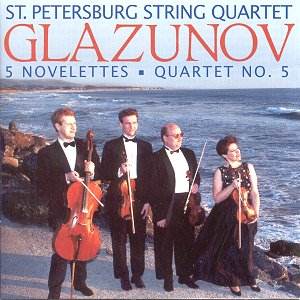 |
Alexander GLAZUNOV (1865-1936) Crotchet
AmazonUK
AmazonUS |
The St Petersburg String Quartet's ongoing Shostakovich cycle on Hyperion has already assured them of a place on the contemporary musical map. Their previous release on Delos (both of the Prokofiev String Quartets and Nadarijshvili's First Quartet) gives testament to their commitment to Soviet music, a dedication once more in evidence on this valuable disc. Aided by a clear and well-spaced recording, their infectious joie-de-vivre finds an ideal outlet in this music. The instruments are realistically spaced in a believable acoustic.
Glazunov's Five Novelettes, Op. 15 of 1886 is dedicated to the composer Anatoly Liadov. Whilst the pieces make reference to various musical regions ('Alla spagnuola', 'Orientale', and 'All'Ungarese'), the underlying language is consistently Russian in accent. The St Petersburg String Quartet are full of life and vivacity: the 'Orientale' is infectiously rhythmic, its middle section with its drone-like bass acting as the perfect contrast. The Quartet prove that they can play heavily without overdoing it in the concluding 'All'Ungarese' (the only movement to draw on an actual folksong, in this case an Hungarian one). This performance acts as the perfect supplement to the more old-style Hollywood String Quartet's 1955 version on Testament SBT1061 (attractively coupled with Borodin's Second Quartet and Tchaikovsky's First).
The Fifth Quartet in D minor is one of Glazunov's masterpieces of chamber music. Inspiration is high throughout. Counterpoint makes its presence felt in the fugal introduction to the first movement, in the Adagio and in the vigorous exchanges in the finale. The Scherzo is jaunty, but draws on quite complex textures and the Adagio contains much light. The St Petersburg's performance is full of the enthusiasm of youth. They seem almost evangelical in their support of this piece: by all means, if you can find the Shostakovich String Quartet's performance of this piece on Olympia OCD525, hear it, but for now this is the version to have. This is a winning coupling and the performances are always engaging.
Colin Clarke